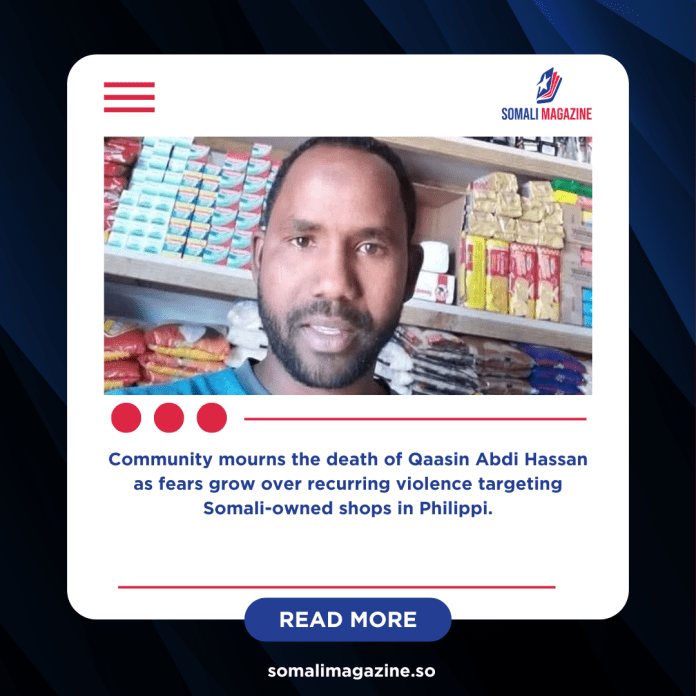Facebook Twitter (X) Instagram Somali Magazine - People's Magazine
The Somali community in South Africa is once again mourning the loss of one of its own after a well-known businessman, Qaasin Abdi Hassan, was killed on Tuesday night in the Philippi area of Cape Town. Hassan was shot inside his business premises, an incident that has deepened fear and frustration among Somali shop owners who have long faced targeted attacks in the region.
Philippi is widely considered one of the most dangerous areas for Somali-owned shops, with violence, armed robberies, and intimidation occurring frequently. Many Somali entrepreneurs operate in townships where crime levels are extremely high, and they often face attacks that appear to be motivated not only by robbery but also by a pattern of organized targeting. For years, Somali shop owners have spoken about threats, extortion attempts, and violence carried out by criminal groups who see foreign-owned businesses as vulnerable. Hassan’s killing is another painful reminder of these ongoing dangers.
Eyewitnesses reported that the shooting happened suddenly and left people in the area shaken. Police arrived shortly afterward, sealing off the scene and launching an investigation. Despite the quick response, authorities have not yet made any arrests. Community members say this is a common outcome; many cases involving attacks on Somali businessmen remain unsolved, leaving families without justice and communities without reassurance.
The Somali community in Philippi expressed deep grief following Hassan’s death, describing him as a hardworking man who had spent years building his business. For many Somali immigrants in South Africa, small shops and kiosks are their main source of income. They run these businesses long hours every day, often in difficult environments, to support families both locally and back home. Losing a businessman like Hassan is not only a personal tragedy but also a community setback.
Community leaders say the end-of-year period is especially dangerous. Historically, attacks, robberies, and killings of Somali shop owners rise sharply during the final months of the year. Criminal groups become more active around the holiday period, when money circulation increases and businesses are busier. Somali entrepreneurs, who usually keep stock for the festive season, often find themselves targeted because criminals believe their shops hold more cash or goods during this time.
Despite raising concerns repeatedly over the years, many Somalis feel that authorities have failed to provide consistent protection. They argue that the recurring nature of these crimes shows that preventive measures are either not strong enough or not implemented effectively. Local policing in township areas is often stretched, and many crimes related to small businesses receive limited attention unless they involve large-scale violence.
Several members of the Somali community have called for the South African government to take stronger action to dismantle criminal networks that target foreign-owned shops. They also want improved policing in high-risk areas like Philippi and quicker follow-up on cases that involve violent attacks against immigrants. Some have suggested establishing dedicated response units or setting up regular patrols around business clusters known to be at risk.
Hassan’s killing is not an isolated case but part of a longstanding pattern. Over the past decade, Somali shop owners in South Africa have lost lives, property, and livelihoods to repeated acts of violence. Many have been forced to relocate multiple times, and some have even closed their businesses altogether. Yet, despite these dangers, a large number continue operating because they have limited alternatives and because their businesses are essential for community survival.
The Somali community in Philippi has urged authorities to expedite the investigation and bring those responsible to justice. They hope that this tragedy will serve as a wake-up call for stronger protection and meaningful changes that can prevent more loss of life. For now, they mourn a respected businessman, a breadwinner, and a symbol of the resilience that Somali immigrants continue to show despite harsh realities.

